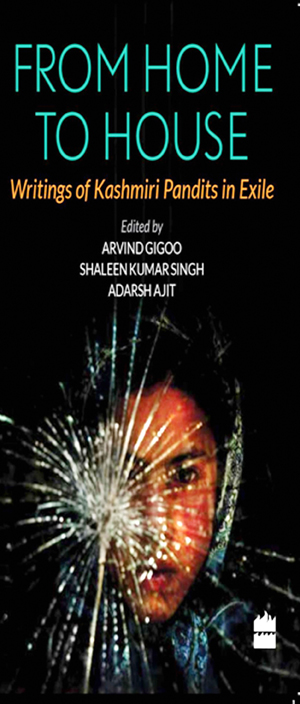Deepak Raj
From Home to House: (Writings of Kashmiri Pandits in exile)
Editors: Arvind Gigoo
Adarsh Ajit
Shaleen Kumar Singh
Harper Collins
Publishers India
Year of publication: 2015
It is for the first time that an anthology of the literature produced by Kashmiri Pandits has been published by HarperCollins Publishers India. The book named From Home to House (Writings of Kashmiri Pandits in exile) is divided into two sections, viz. Fiction and Non-Fiction. In the Fiction section there are seven short stories (two are the English translations of two Kashmiri short stories and one is the English translation of a Hindi short story). All the short stories are connected with the issues that touch the migration of Kashmiri Pandits. Besides the short stories, the Fiction section has the extracts from four novels written in English by Kashmiri Pandits and the English translation of an extract from one Hindi novel. Non-Fiction section has twelve essays, two extracts from two books of memoir and some cameos. Seven contributors are women.
The writings are on varied issues connected with the exodus of Pandits. Through this book the non-Kashmiris will come to know about the reasons behind the migration of Pandits from the valley and their condition out of their homeland, Kashmir. One essay written by a non-Kashmiri is included in the book details the relationship of the Kashmiri Pandits and the people living of Jammu. It is about cultural assimilation of the two communities.
The essays are on various aspects of the migration of Pandits, viz. their nostalgia, pain, their past, their present predicament, their hopes, their sorrows, their life in Kashmir, their tourist visits to Kashmir, their future plans, effect of migration on the old, the young, women, their life in the camps, their experiences, their place in the changing political scenario, their hopes during the BJP rule with Modi as the prime minister, their fears, their humanism, their revolutionary spirit, their fearlessness, their sense of history, their burdens, their anger, their uncontrollable urge to return to their motherland, Kashmir, their dreams, the philosophy of the young Pandits who are scattered throughout India, their view of culture in a world of commerce, liberalization and globalization and their world view. One extract records the conversation of a Pandit abductee with his kidnappers/abductors. The author S N Dhar was in the captivity of some abductors who wanted him to embrace Islam. Home Tourists by Sushil Pandit speaks of Pandits as tourists to their homeland. One essay authored by M K Kaul Naqaib records the feelings and emotions of those living in camps. Another essayist K N Pandita warns against politicians and asks his community to embrace new attitude towards life, change their outdated way of living and move forward in this world of science and technology. He pleads for a total overhaul of life-pattern. A young man Deepak Tiku writes about generation gap between the elderly parents and their young children. He comes up with a new philosophy of life. A female writer Veena Pandita writes about the pain of the elderly women caused to them by migration. All the essays are rich material for studying the sociology of the Pandit community.
The book is an important social, literary and political document for the English knowing people in India and abroad. Through this book the intellectuals, politicians and Kashmir watchers in the country and world will come to know about the condition that the Kashmiri Pandits have been living in for the past twenty-five years. Besides, it will prove a very fruitful and significant book for the future generations of Kashmiri Pandits. The nicest thing about this book is that it has come out in 25th year of the migration of Pandits.
All the contributors and translators are named and referred to at the end of the book. The blurb is precise and to-the-point and presents the soul of the book. From Home to House (Writings of Kashmiri Pandits in exile) is a major contribution to the literature of diaspora in India. It is a reference book for the researchers and students of the Kashmir issue. Kashmir problem can’t be understood and analyzed unless one studies the history of the Pandits of Kashmir and the reasons behind their ouster from the beautiful and peaceful (once) Kashmir. The valley known for its humanism, Sufism and Kashmiriyat lost its soul when 3,50,000 Pandits were hounded out of the place of their birth, upbringing and growth. Nobody cared for this community of intellectuals, writers, thinkers and nationalists. Their love for their nation proved their undoing. They had to pay a very heavy price for their patriotism and intellectualism. Their castaway life has been described in the essays and creative writings in such a way that one is forced to empathize with them.
By dedicating the book to Kalhan Pandit, who gave Rajtarangini to the world, the editors hint that all Kashmiri Pandits and others should read the most important history book written by the great chronicler, Kalhan. The quotations at the beginning shout the pain and frustration of people in exile. The beautiful get-up of the book is an added attraction.
In this book one doesn’t find many other writings, short stories and poems written by Kashmiri Pandits during their period of exile. There should have been photographs and paintings too. But in spite of the absence of these things the book is a must read for all. It will be a reference book for the readers in future.


